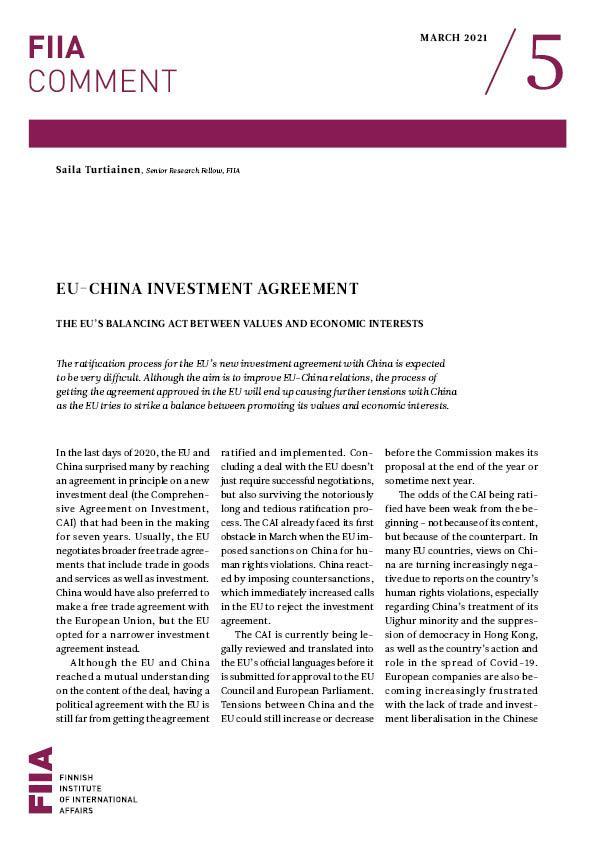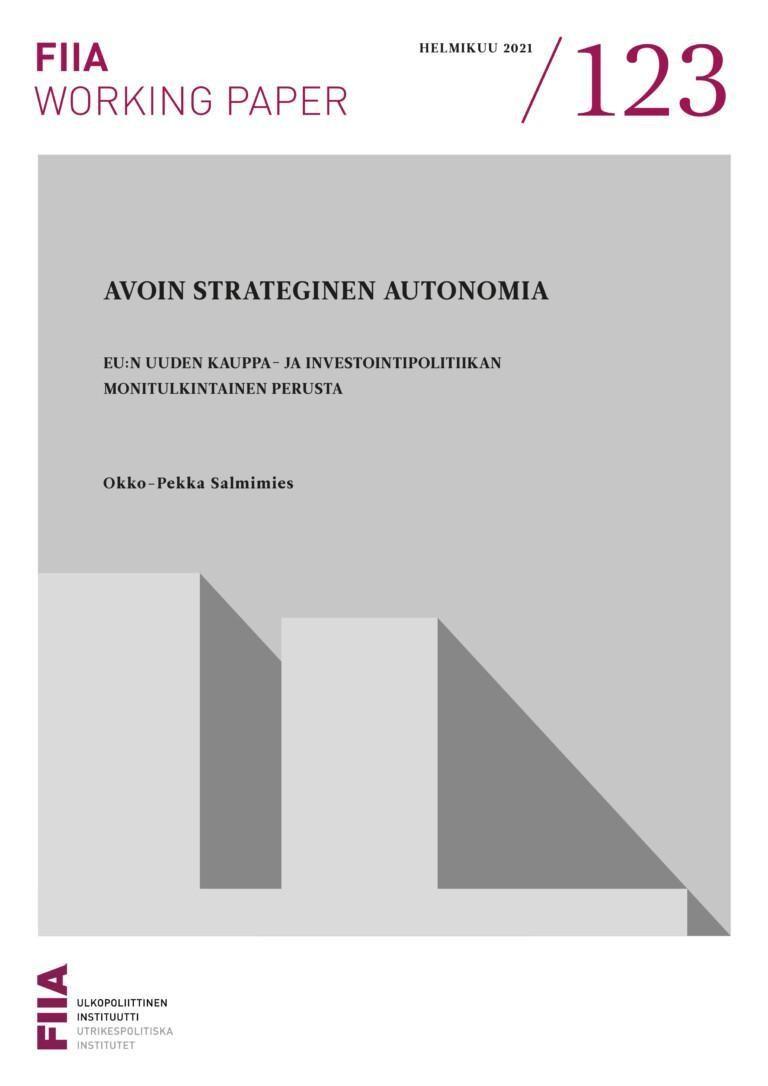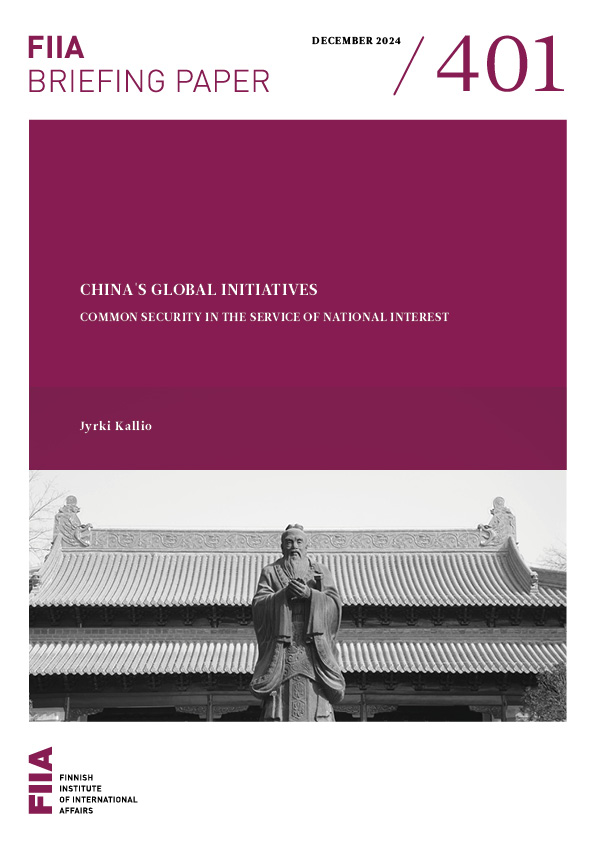The ratification process for the EU’s new investment agreement with China is expected to be very difficult. Although the aim is to improve EU-China relations, the process of getting the agreement approved in the EU will end up causing further tensions with China as the EU tries to strike a balance between promoting its values and economic interests.
In the last days of 2020, the EU and China surprised many by reaching an agreement in principle on a new investment deal (the Comprehensive Agreement on Investment, CAI) that had been in the making for seven years. Usually, the EU negotiates broader free trade agreements that include trade in goods and services as well as investment. China would have also preferred to make a free trade agreement with the European Union, but the EU opted for a narrower investment agreement instead.
Although the EU and China reached a mutual understanding on the content of the deal, having a political agreement with the EU is still far from getting the agreement ratified and implemented. Concluding a deal with the EU doesn’t just require successful negotiations, but also surviving the notoriously long and tedious ratification process. The CAI already faced its first obstacle in March when the EU imposed sanctions on China for human rights violations. China reacted by imposing countersanctions, which immediately increased calls in the EU to reject the investment agreement.
The CAI is currently being legally reviewed and translated into the EU’s official languages before it is submitted for approval to the EU Council and European Parliament. Tensions between China and the EU could still increase or decrease before the Commission makes its proposal at the end of the year or sometime next year.
The odds of the CAI being ratified have been weak from the beginning – not because of its content, but because of the counterpart. In many EU countries, views on China are turning increasingly negative due to reports on the country’s human rights violations, especially regarding China’s treatment of its Uighur minority and the suppression of democracy in Hong Kong, as well as the country’s action and role in the spread of Covid-19. European companies are also becoming increasingly frustrated with the lack of trade and investment liberalisation in the Chinese markets, and market distortions caused by its state-led economy.
Before the investment deal is ratified, China’s actions will be under close scrutiny. It is evident that the increasing reports of China’s human rights abuses might pose a major hurdle for the ratification of the CAI, and it is possible that the EU might step up its demands on China before throwing its weight behind the deal. Canada and Brazil have already been on the receiving end of the EU’s growing list of demands.
In recent years, trade and investment deals have attracted interest from broader audiences in the EU, and they are also raising more concerns over foreign, climate and economic policy issues. This change, together with the growing protectionist sentiments in the EU, has increased uncertainty about the adaptation and ratification process of trade deals. Strongly negative public pressure against the agreement might make it politically impossible for the European Parliament or some EU countries to support the agreement, although the agreement itself corresponds with the EU’s negotiating objectives. In the case of the CAI, this turn of events is considered highly likely.
The CAI is not an ambitious trade agreement that would provide a significant boost to the economy or require difficult concessions from the EU. The lack of ambition also means that the CAI can only address a small number of China-related challenges. In essence, it is an attempt by two large trading partners to promote their trade relations through small steps.
In the agreement, China commits to preserving the current level of market access in many sectors, strengthening predictability. China will also create a new targeted market opening, for example in electric car manufacturing, healthcare and cloud services. In addition to market access, the CAI includes rules on, for example, the transparency of subsidies, prohibiting forced technology transfers, and sustainable development.
Although the substance of the CAI is modest and not particularly problematic, it will ignite more debate in the EU about China-related issues and how the EU should address them. As critical views towards China are mounting, getting the CAI ratified would mean that the EU would not only use its existing instruments, but also create new ones that can address unfair trade and human rights violations. This would serve to demonstrate to the public that the EU is not being too soft on China. However, as these policy instruments gain more support, they will also create further tension between the EU and China. Indeed, the CAI could end up being counterproductive, accelerating the growing tension between the EU and China and creating new trade barriers. From this perspective, declaring the CAI a win for China is rather premature.
In the EU, concerns over the potentially negative impact of the CAI on the EU’s relations with the US have been exaggerated. The US had been negotiating a similar agreement with China under President Barack Obama, but during Donald Trump’s presidency, the country changed tactics and negotiated a smaller trade deal instead. This Phase One agreement includes some of the same elements as the CAI, but it also entails purchasing commitments whereby China is expected to buy certain products from the US instead of other countries, directly hurting other foreign exports to China. The US is not in a very strong position when it comes to criticising the EU, and it will end up accepting the CAI as a price to be paid for Trump’s trade policy. The likelihood of the CAI creating any major problems in EU-US relations is marginal, but the same can’t be said of its impact on the EU and China.











